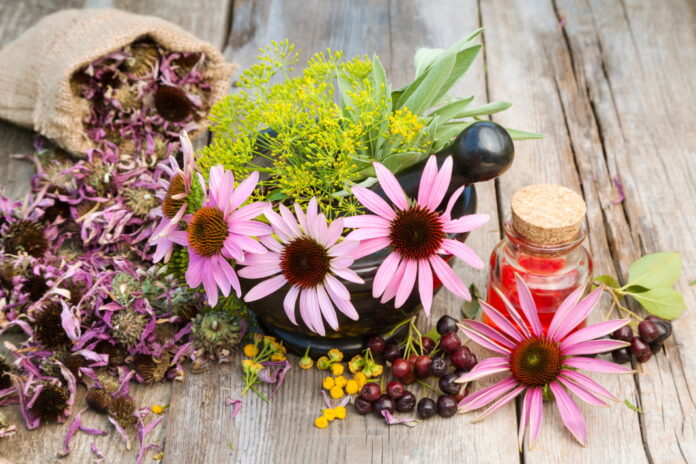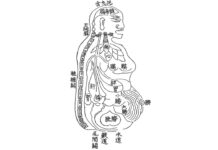
It Helps Enhance the Immune System To Reduce Symptoms from the Common Cold
By Dae Sun Hong, L.Ac.
I have difficulty adapting dry weather of California in the earlier years of my immigration. Typically, temperature differences during the day and night made me a lot harder to stay away from getting cold and allergies. Echinacea is one of the herbs that helps the most effectively treat common cold and allergy symptoms. I have good memories of the herb.
Echinacea has been getting more attention from people in the U.S. It was the most frequently searched herb in the National Center for Complementary and Integrative Medicine, which is a part of the National Institute of Health within the U.S. Department of Health and Human Services.
Echinacea
There are nine known species of Echinacea, all of which are native to North America. They were used by Native Americans of the Great Plains region as traditional medicines. And the most commonly used species is Echinacea purpurea. It is also called Cone Flower by its shape of peddles.
Echinacea is promoted as a dietary supplement for the common cold and other infections because it can more effectively stimulate the immune system against infection. Echinacea preparations have been promoted for topical use (application to the skin) for wounds such as those cut by a knife, stung by an insect, and various skin problems.
Echinacea reduces inflammation in the mouth, uncomfortable symptoms due to the common cold or measles, and joint pain from arthritis.
The herb was listed in the King’s American Dispensatory, a book first published in 1854 that covers the uses of herbs used in American medical practice, especially by those involved in eclectic medicine, which was the botanical school of medicine in the 19th to 20th centuries. In the 1930s, as antibiotic use was popular, the need for Echinacea decreased, but in the 1970s, as natural medicine got more attention, studies regarding the herbs surged. Especially many studies done in European countries still are mostly referred to.
Major hospitals in the U.S. introduces Echinacea, including Maryland University of Integrative Health, MUIH, “people use echinacea to shorten the duration of the common cold and flu, and reduce symptoms, such as sore throat (pharyngitis), cough, and fever.”
Other research proved that Echinacea enhances the immune system, reduces inflammation and pin, and acts as an antioxidant and antiviral agent.
Benefits
Echinacea has strong power to kill various viruses, bacteria, fungi, and strongyle. Research performed in Germany says that extract of Echinacea effectively treats tonsillitis, meningitis, whooping cough, and ear infections. Echinacoside and Echinacein are the chemicals contained in Echinacea that act as natural antibiotics, and they seem to work like penicillin. Also, Echinacea inhibits infection of tissues by increasing the resistance of healthy tissues in the body.
Echinacea helps the efficiency of macrophages to engulf and digest microorganisms. A group from Munich University, Germany, proved that Echinacea extract enhances the activity of T-cell’s activity by 30% compared to other immunomopotentiators. The study also found that the herb could act as Interferon to suppress virus reproduction.
The research result could explain why Echinacea could help control vaginitis relapse with anti-yeast creams.
Rheumatoid arthritis is another indication of the herb. Many doctors in Germany have been using Echinacea to treat the symptom.
Precautions
Possible Interactions
If you are taking any prescription medications, including medications used during surgery, such as anesthesia medications, you should talk to your doctor before taking Echinacea. Some of the well-known interactions include the following: Econazole, immunosuppressants, and caffeine.
One who uses special attention to tuberculosis, leukemia, diabetes, connective tissue disorders, multiple sclerosis, HIV or AIDS, any autoimmune diseases, or possibly, liver disorders should not take Echinacea. There is some concern that Echinacea may reduce the effectiveness of medications that suppress the immune system.
If someone experiences allergic reactions after taking various forms of chrysanthemum or marigold, they should not take Echinacea.
How to take
Boil two teaspoonfuls of the root of Echinacea with one glass cup of water for 15 minutes. Take the tea three times a day. Some could feel a numbing or tingling sensation on the tongue after taking the tea, but the symptom disappears and is not harmful.
Echinacea could be prepared as a tincture. Fill a one-pint bottle with the root of the herb and fill the bottle with any vodka. You have to shake the bottle once every two days, and if the volume of the vodka is reduced, fill the bottle with new vodka. The dose of tincture is one teaspoonful, and it can be taken up to three times a day. Normally, it takes two to three weeks to make Echinacea tincture.





































